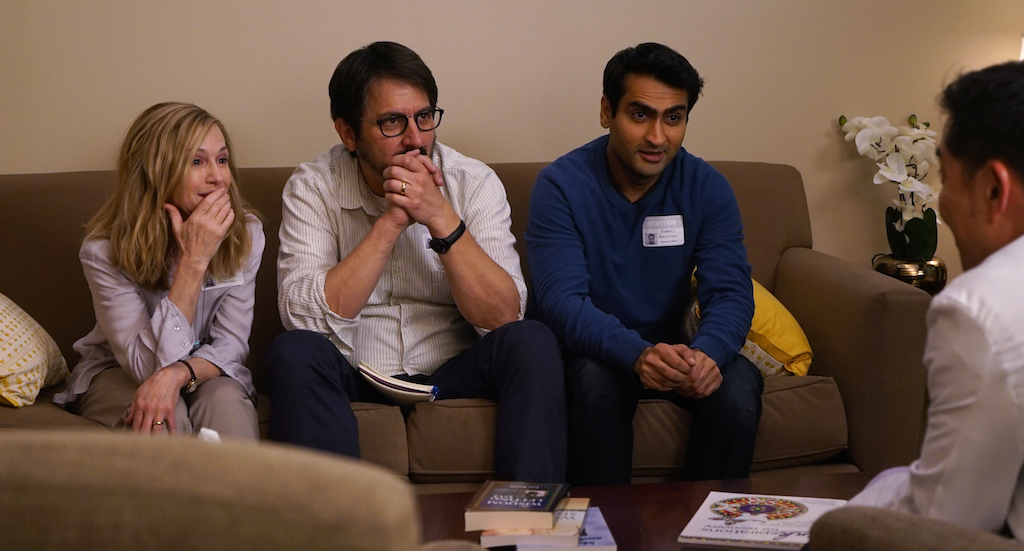
Michael Showalter’s The Big Sick, which is based on the real life courtship of star and co-writers Kumail Nanjiani and his wife, Emily Gordon, is being promoted as a romantic comedy—but it actually tells two loves stories. The first is the more conventional one: Nanjiani, playing his alter ego, also named Kumail, is a Pakistani stand-up comedian who falls for an American grad student named Emily (Zoe Kazan). They have a cute courtship, a knowing and flirty chemistry—but there’s one problem. His family, to whom he’s very close, expect him to end up with a Pakistani girl, the traditional way, through arranged marriage. He doesn’t have the heart to tell his parents—or really even himself—that he wants to break with tradition. When Emily finds out about his lies and ambivalence, she breaks up with him.
The second love story is more unusual, but no less compelling: Shortly after Kumail and Emily break up, she falls very ill. Kumail rushes to the hospital and discovers, with horror, that she has an infection and has been put in a medically induced coma. He calls her parents—he cleverly (if somewhat morbidly) has to use her thumb to unlock her phone—and blurts out, “I just want to say Emily is fine. She’s also in a medically induced coma.” Her parents, Terry and Beth, played by Ray Romano and Holly Hunter, rush in to Chicago from North Carolina (the person who decided to cast Hunter as Kazan’s mother deserves a raise, by the way). At first they don’t like Kumail—not because he’s Muslim, they’re more evolved than that (although Terry does start an awkward conversation about 9/11)—but because they know the whole grisly story of Kumail and Emily’s breakup. But eventually, Kumail’s dogged devotion to Emily—her illness has brought his true feelings for her into high relief—breaks down their resistances and they begin to accept him. One night, he reluctantly agrees to let them tag along to his standup act and Beth and Terry get into a fight with a racist heckler. This is a turning point. The three become true friends—family, really—with all their feelings of affection amplified by their concern for Emily.
The performances here are top notch. Kumail, who rose to fame on HBO’s Silicon Valley—and by being a badass on Twitter—is a naturally likeable guy, with a great deadpan and a perfect comedian’s face—just to left of handsome, like a Sardi’s caricature of a matinee idol. Hunter and Romano are both great—they feel like real people in a real, lived-in marriage. And between this and What If, the doe-eyed, whipsmart Kazan is proving herself to be the indie rom-com queen—she’s particularly good in the physically and emotionally tentative scenes when Emily wakes up from her coma.
While most reviews have been glowing, a few highly misguided people have accused The Big Sick of being too long. To me, one of the beauties of the film is the fact that it has room to flesh things out, to linger and crease and breathe. So we learn a bit about Terry and Beth’s marriage—they are going through a rough patch—and we get glimpses at Kumail’s life on the comedy circuit (his friends convey love through a relentless stream of trash talk). We get a chance to meet some of the Pakistani women paraded in front of Kumail for potential marriage (one pretends to be a fan of The X-Files to impress him) and see a lot more of his home life, with a family that manages to be both nurturing and oppressive. All the characters are flawed but sympathetic—the film has a true generosity of spirit.
In an ironic way, Terry and Beth find themselves in the same position Kumail’s parents have been in. They’ve already decided they love Kumail and want him to be their son-in-law. But will Emily take him back? Of course, the now-famous backstory of the film ruins any suspense we might have on that front. But in life—and most certainly in this big-hearted and insightful comedy—the glory is in the details.
